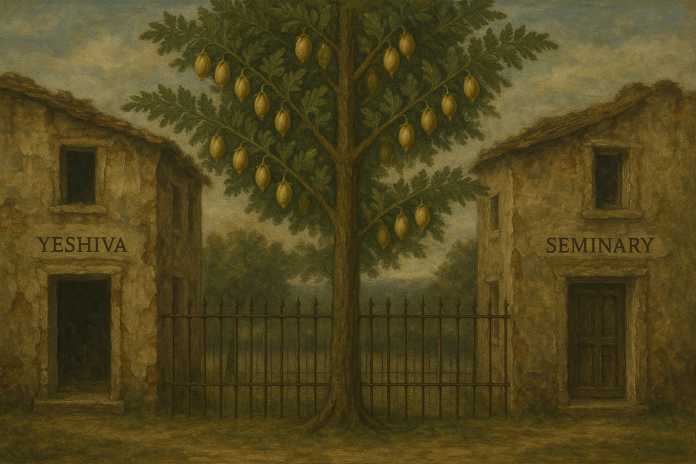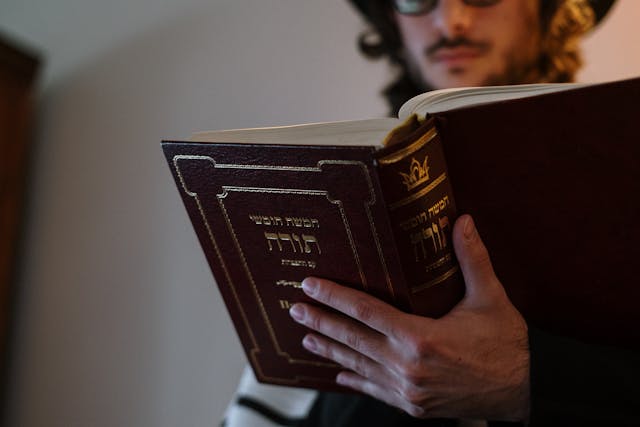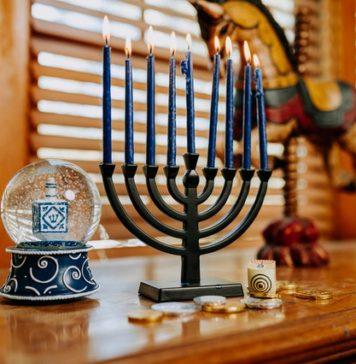Although the narrative is embellished, all the laws and anecdotes described below are real.
It so happened, due to a funny quirk from the Holy One Blessed Be He (“God has a great sense of humor,” my mother used to say) that The Beis Guberman Yeshiva for Impressionable Young Men, was located right beside the Hirschofsky Seminary for Girls Who Are Not Sluts.
A fence separated the two schools. On the men’s side, a banner with a picture of a highly wizened rabbi proclaimed: May Your Eyes See The Guidance of Your Teachers. On the women’s side, a picture of a flower juxtaposed with the reminder: Blessed is the A woman who is not a Total Whore.
Eliezer “Easy” Givaldenshtok was a student at Beis Guberman. Not a shining pupil, what he lacked in brains he made up in simplicity. He was always in the study hall when studying was expected, if not learning, then at least trying to learn. He did not partake of the evils that other yeshiva students did, such as smoking, or getting a driver’s license, or, most heinously of all, partake of pornography.
When it came time for his match to be made, it was his purity of heart that was highlighted. “Easy will make a great groom, the Mashgiach extolled. “His heart is as pure as chicken soup broth.”
Sheindel “Sheindy” Blumenhoff was a student at Hirchofsky’s. She knew all about babies, since she’d been taking care of her 13 siblings since she was old enough to walk. When it was time for her to start getting her period, her mother had read her a book called “Becoming You” that had a picture of a girl smelling a flower on the cover. It talked about periods, but not about reproduction or sex. She learned about pads, but not tampons, because tampons are too similar to dicks and we don’t want anyone getting off on their tampons.
Easy learned about sex from the Torah. He learned that it was like putting a paintbrush in an inkwell. He learned that there was a normal way and abnormal way to do it. He learned that if he was very pure of heart he would not have any nighttime emissions, just like our forefather Jacob didn’t.
In order to maintain purity of heart and camp, it was important to never refer to sex as sex. They used euphemism instead. It was “arrival”. It was “servicing the bed”. It was “ritual bath night”. He learned that it was an act that one shouldn’t do too often, like chickens do; and that ejaculation automatically made you impure – but that when done right was actually a very holy act.
When it was time for Easy to get engaged to Sheindy his parents gave him a choice – would he like to marry her, the first he’d ever met, or date more women? Easy was torn. On one hand, this woman was a woman. On the other hand, the more women he’d date, the more information he’d gain, such as which hotel lobby served the best coffee. He was given full freedom and zero information to make a decision. And make it he did. He would choose Sheindy as his soulmate, and they would create a Faithful House Amongst the People of Israel.
Right before the wedding, Easy had several meetings with his Chosson teacher. This was a rabbi who taught grooms everything they needed to know about being a married man, which primarily consisted of identifying different shades of period blood and counting days until his wife was ritually clean again. For, every month when a Jewish woman bleeds, she must wait until her period ends, wear white underwear and probe herself twice a day with a white cloth for seven days, and then go to a ritual bath. If she found any blood at all she had to restart her seven day count. If she had doubts she would need to send her underwear to a rabbi for review. The good news was that being with your wife on ritual bath night was a big Mitzvah – a truly worthy deed.
His teacher didn’t just limit him to the laws of Blood and Baths, although that was the bulk of it. He had other advice too: don’t argue with your wife. It’s like arguing with a toddler. When you’re doing the act, don’t rawdog it. Use a lubricant, like Vaseline. And just to make sure, the teacher had asked, avoiding eye contact and feeling deeply uncomfortable, Easy did know what happened on wedding night, right? (This was the part he hated most about his whole Chosson teacher job, the sex bit.)
Easy assured him that he did.
And so, on the eve of his wedding, having never touched a woman before, Easy applied his knowledge of years of Talmudic study and preparation for this holy moment by slathering his dick with Vaseline and jabbing it at Sheindy’s navel.
Months passed. Sheindy remained barren, like our foremothers. They were not blessed with a baby, despite trying as hard as they could. Easy prayed harder. Sheindy cried to the creator of the universe. Oh why was God testing them so? It was time to do more manmade efforts. Although salvation ultimately comes from The Compassionate One, sometimes His messengers can even be secular Jews who have gone to medical school. They went to a fertility doctor. He examined the bruises on Sheindy’s stomach. He asked a few pointed questions. And he proceeded to explain to them a very horrifying set of behaviors that no holy person should ever have to even hear about.
“So you’re telling me Rav Shach puts his appendage inside his wife’s lower mouth?” said Easy, using the correct biblical terminology.
“At least 12 times,” the doctor reassured him. With great trepidation and feeling of deep impurity, Sheindy and Easy went home to give it a try.
But alas. Despite doing it the right way, several more months went by and not a single baby boy had presented itself. Easy was even willing to have a girl at this point. Back to the doctor they went.
He asked a few more questions. He probed and prodded, figuratively and literally. And he came to the root of the issue. Sheindy’s cycle was a bit shorter than average, and her bleeding a little heavier. Thus, by the time she had finished bleeding and counting clean days she’d missed her ovulation window.
It was time to combine the wonders of modern medicine with ancient Jewish wisdom. “If you refuse to have sex with your wife for over two weeks after she gets her period,” the doctor explained. “She’ll need to be artificially inseminated.” Easy and Sheindy wondered why Hashem would possibly make things so difficult for them, financially and emotionally. But they resolved to grow from these challenges and to purify their hearts and souls through the process.
The next problem arose. Normally you’d just masturbate into a cup and let the in-vitro process unfold from there. Unfortunately, the Torah prohibits masturbation, it’s the grave sin of spilling seed, and it’s what got Onan killed in the bible. The workaround they devised was as follows: Easy and Sheindy would have sex in a halachically permissible manner (missionary at night with the lights off under a blanket, obviously). Then Sheindy would rush over and have them remove the sperm from her body to use in the procedure. Eyebrows were raised at the non-sterile conditions that sperm would be exposed to. But they insisted. These were their deeply held beliefs at stake here. This was the word of God they were following. And the clinic eventually complied.
The verse says “seven times the righteous man shall fall and get up”. Hashem tests his most devoted subjects more, to ensure they are faithful. And so it was, after this third challenge and much heartache, Hashem finally blessed Easy and Sheindy, the way he blessed the biblical Rachel and Rebecca. And he delivered a double blessing, as the verse says “I shall double your crop in the sixth year”. In a remarkable act of grace that was definitely not related at all to in-vitro fertilization practices, Easy and Sheindy were blessed with twins.
A boy and a girl. So much joy. They had leapt ahead and made up for so much lost time. Even though they were already aged 21 and 23 respectively, they had caught up to their friends.
The sabbath before the circumcision, they had a party, as is tradition, called “Hello Male”. Amidst the shots of cheap whisky and ruggalach, the assembled men made sure to partake of chickpeas, whose circularity, the Rabbis tell us, remind us of the circle of life.
Easy sat at the head of the table, glowing. Sheindy peeked out from the kitchen, also glowing, from happiness but also from heat. Their eyes met. A bright future awaited their family, and they imagined with joy in their hearts their children growing up into God fearing servants of the Holy One.
They couldn’t wait for the day when their offspring in turn could attend Beis Guberman and Hirschofsky’s.
The circle of life strikes again.

















